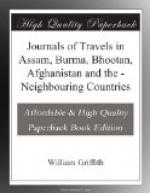The chief trees about the city are mulberry, a few Khunjucks, which is the Xanthoxylon of Bootan and the Kojhlak passes, occur outside; willows are frequent, and generally appear to be cultivated, among these a weeping species here and there occurs.
May 3rd.—The resources of the city are evidently small, the only things indeed that appear plentiful are earthenware and milk: grain is excessively dear, but is reported to exist in considerable quantities. Khoondil Khan having ordered all those out of the city, who had not provided themselves with six months’ provisions. Atta or flour is now selling at two seers a rupee, or 6d per pound, and every thing is proportionally dear: wood excessively so, the chief fuel is derived from the Santonia, which in some form or other appears to constitute a principal feature of the vegetation of Central Asia, and there is some other wood apparently derived from some tree I have not yet seen.
Some discontent prevails in the town owing to the high price of provisions, which is, no doubt, severely felt. The established price of grain is at the rate of eight seers the rupee, a rate established by the king, but on occasions like the present there can be no rule. Water is very abundant, it is to be found within four feet of the surface, and some regiments have already supplied themselves from this source by means of temporary wells. The water is excellent.
Asses, ponies, and horses are common, the former are excellent, 150 rupees is a good price for one; they carry heavy loads with the additional weight of an Affghan on their back; the ponies or tattoes are less valuable, but still they are strong.
The horses are indifferent; good, generally speaking, but heavy, and with little spirit. Excellent milch cows have been procured for twenty-five rupees, including the calf. Goats are not easily procurable. Sheep (Doombas) are common, and afford excellent mutton, they vary in price from two to three rupees.
Tea from Bokhara is procurable in small quantities; its quality is decent: it was originally eight rupees a seer but is now thirty. Coarse Russian cloths, and very inferior silks are also procurable.
The great drawbacks are the want of wood, and above all want of inhabitants; from what I have seen of the cultivation, the soil appears to be very capable, and well adapted to barley and wheat; rice might also be raised as a summer crop. With regard to water, if there is a scarcity of this element, it is due to the indolence of the people. I have not yet seen any vestiges of buildings, topes, etc. to indicate that Candahar has ever been a very populous place, the want of trees considering the ease with which they may be cultivated, is a strong evidence of the extreme laziness of the Affghans, who appear to me remarkably low in the scale of civilization; and in personal habits, very generally inexpressibly filthy.




